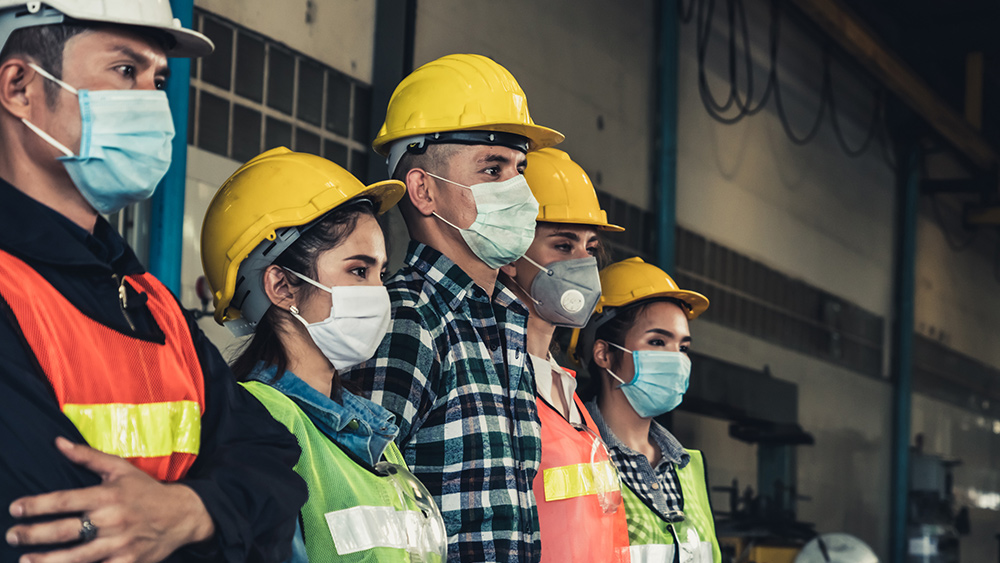Actually no, masks do NOT kill, and choosing not to wear one is an unnecessary risk
05/24/2020 / By Tracey Watson

There is so much we do not yet know or understand about the novel coronavirus, but there is one thing of which we can be 100 percent, absolutely sure: Making life-or-death decisions based on the often unscientific or factually inaccurate opinions people express on social media is like playing COVID-19 Russian roulette.
A perfect example of this is the heated debate raging online between those who insist that wearing a mask when in public can save lives, and those who claim that doing so is either unnecessary or could actually kill you.
According to the latter group, masks can reduce the amount of oxygen available to the wearer, causing them to breathe in large amounts of their own carbon dioxide. All that carbon dioxide, they claim, could cause people to suffocate or have seizures.
But what does the science say about this? After all, healthcare workers have been wearing masks in theaters and other medical environments for decades, so it is not as though this is something new and unexplored.
Are there sound – and lifesaving – reasons for wearing a mask to protect not just the wearer but those they share space with, who may be at increased risk of developing complications or dying from COVID-19? (Related: Wearing masks to block the coronavirus is going to become the new normal.)
What the experts say
As reported by the U.K.’s Daily Mail, reports have been flying around on social media claiming that wearing a mask can cause so much carbon dioxide to build up that it could cause someone to pass out or even die from hypoxia, which occurs when tissue oxygen levels are extremely low.
Experts agree that wearing a mask can be extremely uncomfortable, but there is zero evidence to support the theory that they can be life-threatening.
“[Masks are] not comfortable and there is data that shows they can cause headaches, they’re irritating and it does interfere with daily life,” noted Dr Steve Lubinsky, medical director of respiratory care at New York University Langone Health. “I think people kind of sense that. These are common symptoms we all get and I think people may have focused on that.”
He adds that in New York City doctors know from first-hand experience that there is a “significant risk of illness and death in patients who get COVID-19,” and they have been forced to watch as thousands of people have become gravely ill and have ultimately died.
But they have never seen anyone get sick from wearing a face mask. Not one single patient. (Related: After months of rejecting masks and watching infections spread, Trump finally orders all White House officials and visitors to wear masks.)
In an effort to reassure people, Dr. Rebekah Diamond, a New York City pediatrician with Columbia University Medical Center, set out to prove scientifically that while wearing a mask is super uncomfortable, it isn’t going to kill you.
The Mail reported:
In her experiment, she shared a picture of her carbon dioxide levels after a day of wearing an N95, which showed the mask did not drive her CO2 up to dangerous levels. …
Normal PCO2 levels are between 35 millimeters of mercury (mmHg) and 45 mmHg.
Diamond took a blood test that showed the levels of gases in her body. Her CO2 levels were 36.4 mmHg. [Emphasis added]
“So here’s my normal venous CO2 after wearing an N95 all day to remind you it’s really ok. Don’t let fake science enable unsafe decisions [please],” she wrote on Twitter.
And there is at least one really good reason to wear a mask every single time you go out in public. A study published in the New England Journal of Medicine found that “people may acquire the coronavirus through the air,” after researchers found that it can linger in the air as aerosols for three hours or more.
Sources for this article include:
Submit a correction >>
Tagged Under:
carbon dioxide, coronavirus, covid-19, infections, mask safety, masks, outbreak, pandemic
This article may contain statements that reflect the opinion of the author
RECENT NEWS & ARTICLES
Infections.News is a fact-based public education website published by Infections News Features, LLC.
All content copyright © 2018 by Infections News Features, LLC.
Contact Us with Tips or Corrections
All trademarks, registered trademarks and servicemarks mentioned on this site are the property of their respective owners.





















